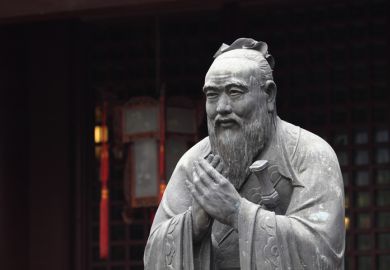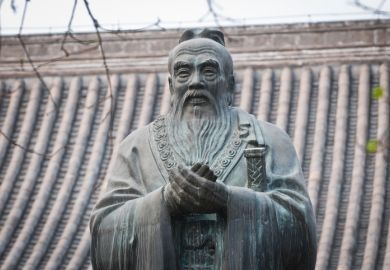A congressionally mandated expert review has recommended that US universities be allowed to resume their work with Confucius Institutes as long as they meet conditions meant to minimise Chinese government influence.
The assessment, organised by the National Academy of Sciences and led by outgoing Dartmouth College president Philip Hanlon, concludes that Confucius Institutes could be revived at universities across the US if the institutions meet a set of guidelines that include the host campuses demonstrating full managerial control of Confucius Institutes curricula, instructors and other operations.
US politicians critical of China and its Confucius Institutes should understand that the US may also be risking its national security by refusing to engage with them at all, Professor Hanlon said in an interview.
“Having students who are interested in China, who have received exposure to training in Chinese language and culture, is both an economic and national security advantage for the United States,” he said.
The Confucius Institutes are a network of Chinese government-backed language and cultural educational programmes that once had been present on at least 118 US campuses, but have shrunk to a tiny fraction of that level due to growing fears that the institutes enable pro-China political influence and possible espionage through US college campuses.
Fewer than 20 such partnerships remain in the US, according to a running tally by the National Association of Scholars, a politically conservative advocacy organisation.
The closures have been due largely to provisions in Department of Defense budgets in recent years that made universities ineligible for Pentagon funding – a critical component of many academic research operations – if they host a Confucius Institute. The most recent of those requirements by Congress, in the fiscal 2021 federal budget, called for the study led by the National Academies to suggest conditions under which universities might earn exemptions allowing them to keep both Pentagon money and a Confucius Institutes programme.
The 13-member panel consisted mostly of experts with current academic affiliations. Their proposed conditions include a requirement that any US host institution demonstrate that their Confucius Institutes partner “is a formally established centre or institute at the institution, thereby subjecting the CI to all policies and procedures prescribed in faculty, staff, and student codes”.
Other proposed terms include requirements that the US host institution demonstrate that it has “full managerial control of Confucius Institute curriculum, instructors, textbooks and teaching materials, programmatic decisions, and research grants”, and ensure that its Confucius Institute partner has no written requirement to operate under the laws of any foreign nation.
Many critics in Congress and beyond, however, have insisted that the risks of Confucius Institutes are not worth the potential benefits. They include Dov Zakheim, a top Pentagon official under two Republican presidents, who questioned whether any proposed operating conditions would meaningfully restrain the Chinese government in its political and operational control over Confucius Institutes.
“The Chinese are very, very good at working around conditions,” said Dr Zakheim, now a senior adviser at the Centre for Strategic and International Studies thinktank. “The difficulty is that these institutes clearly have become a vehicle for Chinese espionage and a variety of psychological operations and the various sorts of things that they can do below people’s radar screens that can be very effective.”
Professor Hanlon said his panel heard no evidence of any act of espionage conducted through a Confucius Institutes operation, although he acknowledged it limited its review to non-classified sources of information. Dr Zakheim said he too knew of no such specific examples.
In the years since Confucius Institutes were effectively banned by the Pentagon-related funding restriction, some wealthier US universities have found ways of replacing the instruction they provided in Chinese language and culture, Professor Hanlon told Times Higher Education. But many less-resourced institutions have not, he said.
The Biden administration has criticised Congress over its bipartisan hostility to Confucius Institutes in US higher education, although it has not made any explicit immediate commitment to implementing the advice of the National Academies review panel.
The panel led by Professor Hanlon remains in operation, as it is due to deliver a second report by this coming June that looks more broadly at the risks and benefits of foreign-funded partnerships on US campuses.
Register to continue
Why register?
- Registration is free and only takes a moment
- Once registered, you can read 3 articles a month
- Sign up for our newsletter
Subscribe
Or subscribe for unlimited access to:
- Unlimited access to news, views, insights & reviews
- Digital editions
- Digital access to THE’s university and college rankings analysis
Already registered or a current subscriber?








